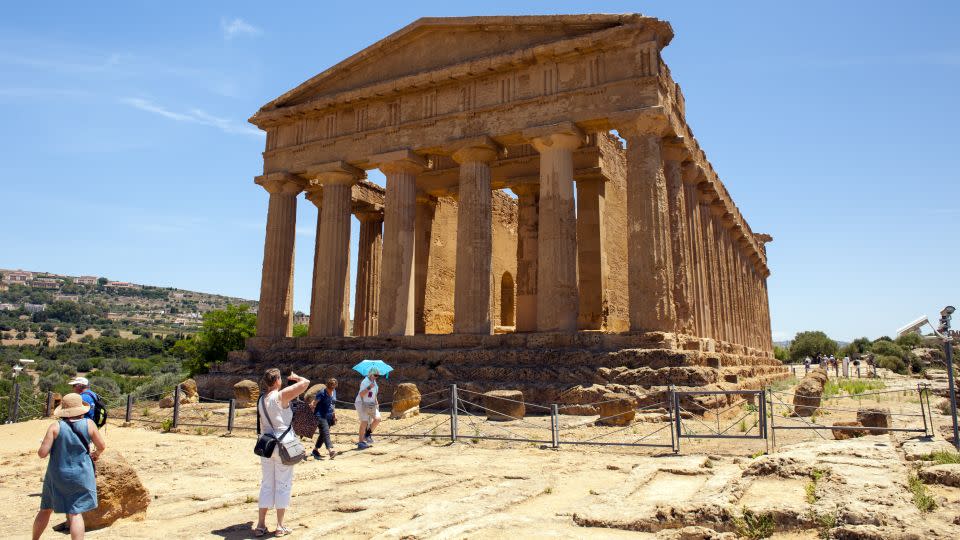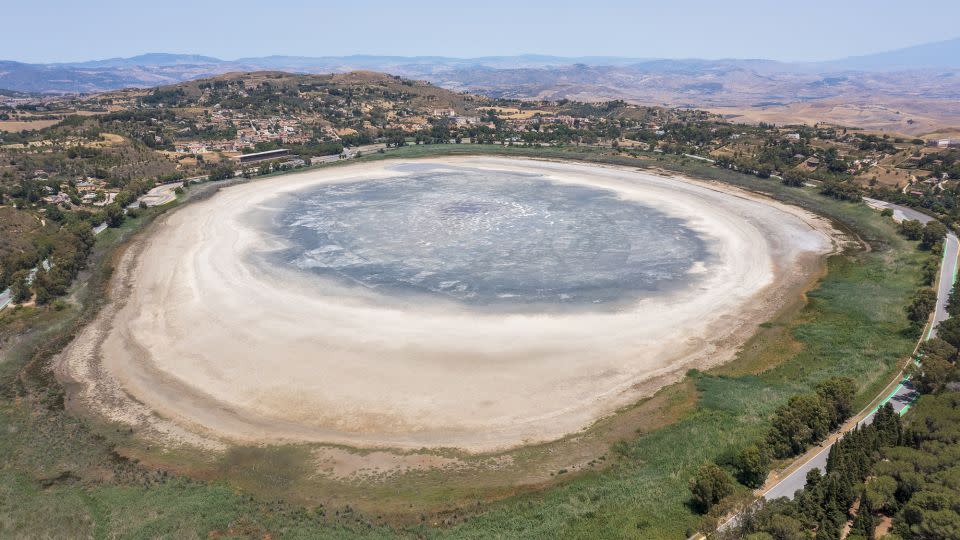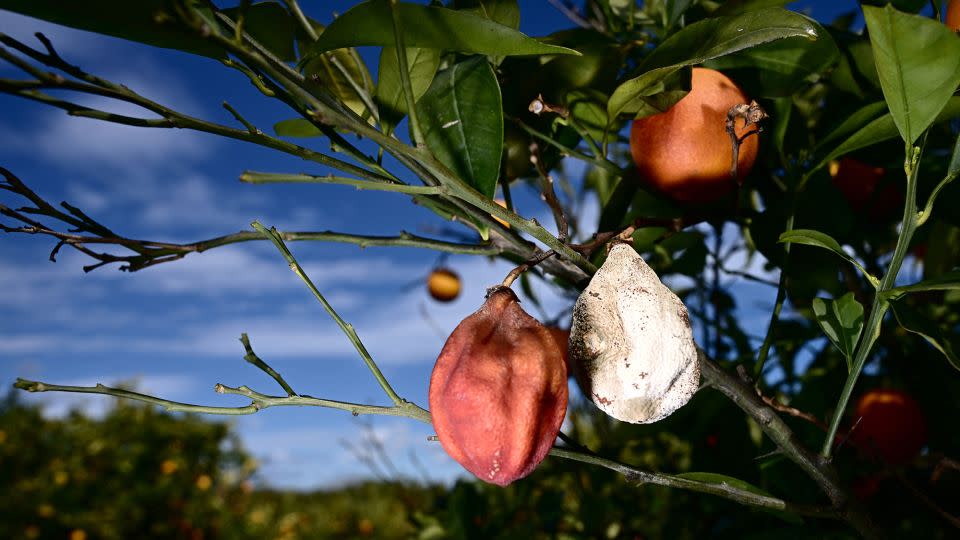Situated on a hilltop on the Italian island of Sicily, Agrigento is a heritage tourist paradise. Beneath the archaeological structures and relics of the Valley of the Temples lies an ancient maze-like aqueduct system that still captures water today.
But the aqueduct, and others built in modern times, are so dry that small hotels and guesthouses in the city and on the nearby coast are being forced to turn away tourists. They don’t have enough water to guarantee their guests a flush toilet or a shower after a day in the summer heat.
Sicily began imposing water restrictions in February when the region declared a state of emergency amid a relentless drought. Precarious and aging infrastructure only worsened the shortage, which hit both tourism and agriculture, two crucial sectors for Sicily’s economy.
Rationing is in effect for more than 1 million people in 93 communities. Some are having to reduce water consumption by up to 45%. This means that taps run dry on schedule and the supply is completely shut off overnight in most places. Having enough water to drink is a matter of organization during the day.
On TripAdvisor and other travel forums, tourists are asking whether the affected areas of Sicily are worth visiting. Hotels are warning customers about possible shortages and helping visitors make new reservations elsewhere on the island where restrictions are less severe or not in place.

At the bed and breakfast (B&B) Le Cinque Novelle in the center of Agrigento, where restrictions are strict, the owners have placed filters in the showers and sinks to save as much water as possible. But your guests often complain.
“Rightly so, people ask us for guarantees before coming, but we don’t know what to say,” Giovanni Lopez, owner of the B&B, told CNN. “The situation is rapidly affecting the entire tourist accommodation sector, which risks serious economic consequences, given that tourism is a sector on which almost everyone in this part of Sicily depends.”
Sicily’s regional government has asked Rome for subsidies to import water from the mainland, but there is still no concrete plan to help the island. The office of Italian Tourism Minister Diana Santanchè did not respond to CNN’s request for comment, but in April it said Sicily should try to spread out its tourist season and avoid focusing solely on summer, when water problems worsen.
Summers in Sicily are becoming unbearable for many.
Last year, the island suffered serious forest fires that forced tourists to evacuate or postpone their visits. Now, water shortages caused by drought are another concern.
Human-caused climate change is warming Europe faster than any other continent, and Sicily is right at the center of this change. It was here that Europe’s temperature record was broken in August 2023, when the city of Syracuse reached 48.8 degrees Celsius (119.8 degrees Fahrenheit).
Other parts of Italy are also experiencing drought, but only Sicily is considered “extreme”, the highest level, according to the Italian National Institute for Environmental Protection and Research (ISPRA).
Less than a quarter of the usual rain fell during the winter across the entire island, which left around 20% of underground aquifers in a state of “water scarcity”, according to ISPRA. In February, the regional government declared a “state of crisis and water emergency” for irrigation and consumption in Agrigento and four other provinces, which will last at least until the end of the year.
Marco Maccarrone, owner of Caico Trattoria e Cantina restaurant in Agrigento, says the island is being left to fight for itself.
“Summer is coming and we are worried. No one has given us alternative solutions for the tanker trucks we are paying for,” he told CNN. “This risks destroying the only resource we have: tourism.”
Maccarone has lived in Agrigento’s historic center for 20 years and complains that the water flow is painfully slow.
“In half an hour we couldn’t fill a single pot,” he said.


Hotels are required to have a certain amount of water reserves relative to their capacity, said Nicola Farruggio, president of the Sicilian Hotel Federation, meaning they also had to buy water from the mainland. But smaller structures, including family-run hotels and inns, often can’t store enough to meet needs. And if they are located in a residential building, they are subject to the strict rations that apply to condominiums, which means they simply cannot guarantee water to guests.
Francesco Picarella, head of the Hotel Federation of Agrigento, which also owns a hotel in the city center, says years of ineffective governance have made things worse. There has been talk of rebuilding the water network since 2011, but little progress has been made, he said.
“Today’s problem is the result of a failed water management policy that has lasted 20 years,” he said. “Hotels that have their own reserves compensate in some way; B&Bs in the historic center are in extreme difficulty.”
He said the reservoirs are drying up due to lack of rain, but also due to leaks.
In response to CNN’s request for comment, Sicily’s regional government office pointed to a study that outlined the government’s plans to drill new wells, build more pipelines and bring old desalination plants back into operation. The report also says that Sicily did not receive sufficient funds from Rome to carry out its plans.
The local federation of guesthouses said it “should have been a golden year” for Agrigento, which in March last year was named Italian Capital of Culture for 2025, an accolade that typically attracts more tourists. “Instead, word of mouth about the water crisis could ruin the season.”
I was also starting to see an increase. In 2023, the number of visitors increased by 24% compared to the previous year, according to Picarella.
The island’s tourism ministry said Sicily expects to receive more than 2% more visitors than last year, after many postponed their trips because of the forest fires.
“People see this destination with a lot of interest,” said Picarella. “This summer we expect a greater number of holidaymakers and every day we have to invent a way to move forward.”
Running out of time
The situation is equally dire for farmers. On an organic farm near Caltanissetta in central Sicily, about 50 kilometers northeast of Agrigento, goats drink muddy mud where a lake once stood. Luca Cammarata, owner of the farm, said the drought means grass for grazing is also scarce. He has never seen Sicily so dry.
The lack of water has left farmers like Cammarata faced with a devastating choice: cull their livestock or let them die of starvation or dehydration.
Citrus growers are also seeing their famous Sicilian oranges wither on their trees due to lack of water. Reservoirs used for irrigation around Mount Etna, where oranges are grown, now hold about half the amount of water they normally do. If there are no summer rains, they will drop to around 25%, according to the ANBI Water Resources Observatory, a government agency.


Overdevelopment of urban centers and citrus and wheat farms has reduced natural wetlands by 20%, worsening the problem, ANBI said.
The regional president of Sicily, Renato Schifani, said that the island’s losses – between harvests, empty reservoirs and dying livestock – have already exceeded one billion euros. That doesn’t even take into account the potential loss of tourism dollars, because tourists who don’t have access to water in one part of the island are booking new reservations in others.
But for communities in places like Agrigento, the losses are devastating.
It’s equally heartbreaking for Cammarata, who says his entire livelihood – his 300 goats, 160 head of cattle and his dairy farm – is at risk.
“The consortium guaranteed water rotation every five or six days,” he said, referring to a representative group of farmers. “Now they can no longer tell us if and when they will turn on the taps.”
The solutions are complicated, even for an island surrounded by water. The three desalination plants that could clean Sicily’s seawater for drinking, sanitation or irrigation have been closed for more than 10 years. Bringing them back online or drilling new wells will take time.
And time is another thing that is running out on the island.
CNN’s Antonia Mortensen contributed to this report.
For more news and newsletters from CNN, create an account at CNN.com





































